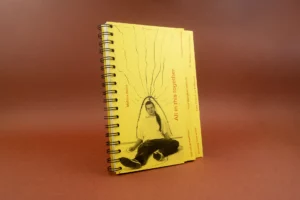YOUR CART
- No products in the cart.
Subtotal:
€ 0

Photography, interviews:
Mafalda Rakoš
Editor:
Dieuwertje Hehewerth
Text contributions:
Alexander Cabeza Trigg
Anna Rakoš
James Davies
Mafalda Rakoš
Marieke Descheemaecker
Editorial assistance:
Lukas Meixner
Marieke Descheemaecker
Paola Lesslhumer
Photography assistance:
Allan Tavares
Proofreading:
Beth Potter
Design:
Carel Fransen
Production:
Jos Morree (Fine Books)
Supported by:
Federal Ministry for Arts and
Culture (BMKOES), Austria
Bildrecht
What are the psychological effects of a pandemic and how do we look back on these times of social isolation? Has it changed how we relate to others and the world around us?
Mafalda Rakoš (AT) questions the impossibility of captivating someone else’s inner world through photography. But also how portraying others relates to discourses around representation, especially in anthropological research. What bigger picture is revealed by looking at the state of our mental health in a capitalist society?
All in this together is both an artistic and anthropological investigation. Together with four protagonists – Sara, Elias, Flora, and Manuela – the artist questioned how social isolation affected their mental health and their non-substance addictions. During their quest, elements of art therapy, documentary photography, performance, and anthropological research all blended together.
Through sessions involving conversations, drawings, and portraits, Rakoš tried to render something invisible – a sense of loneliness, confusion, or even harmony and calm – visible on camera. As the meetings unfolded, their dialogical character took center stage, and another question emerged: How can such an artistic project overlap with a therapeutic process, and where should they be kept strictly apart?
With an essay by Alexander Cabeza Trigg, and conversations with James Davies and Anna Rakoš.
Mafalda Rakoš lives and works between Vienna and Amsterdam. Triggered by the ethical conflict around portraying and representing others, she develops collaborative approaches to create long-term projects in the intersection of art, anthropology and documentary photography, with a strong emphasis on dialogue and mutual decision-making. She has been working with females and males affected by eating disorders since 2013. Her work has been nominated and honored several times at international awards and was exhibited in museums such as the Nederlands Fotomuseum, Rotterdam, Benaki Museum, Athens and the Museum of Contemporary Art in Zagreb, as well as shown outside an art context at conferences on eating disorders or at the General Hospital in Vienna.